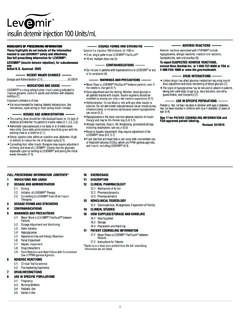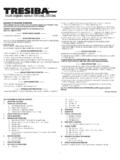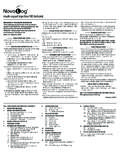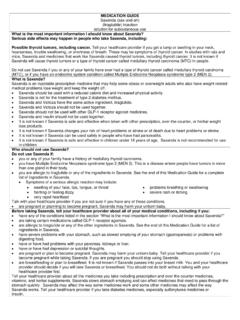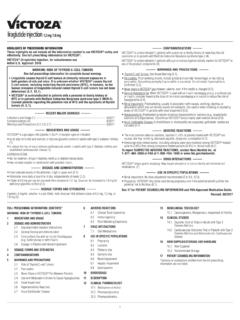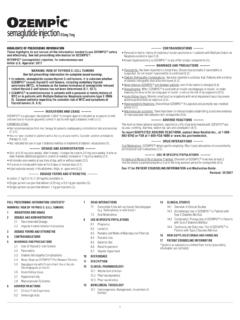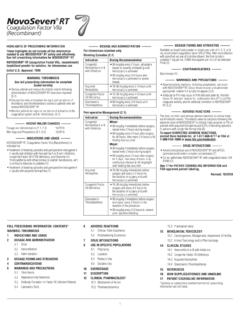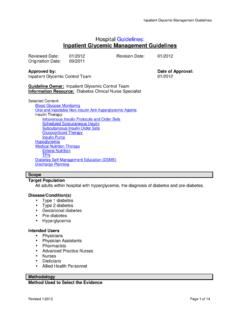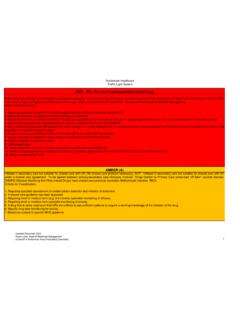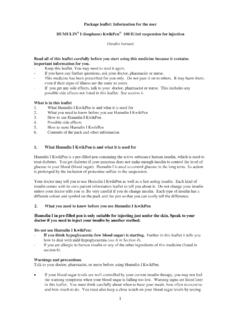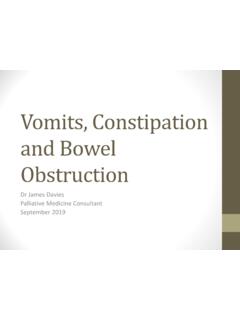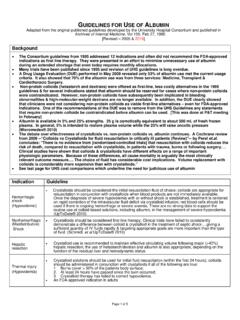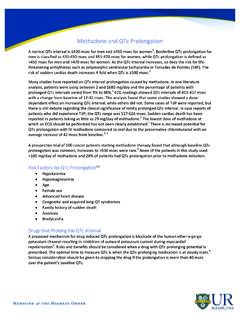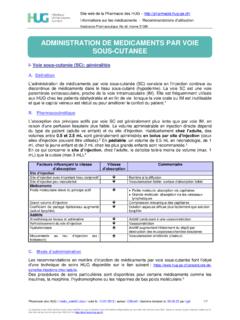Transcription of HIGHLIGHTS OF PRESCRIBING INFORMATION heart failure …
1 1 Dosage adjustments may be needed with changes in physical activity, changes in meal patterns ( , macronutrient content or timing of food intake), changes in renal or hepatic function or during acute illness ( ) DOSAGE FORMS AND STRENGTHS Each presentation contains 100 Units of insulin aspart per mL (U-10 0 ) 10 mL vials (3) 3 mL PenFill cartridges for the 3 mL PenFill cartridge device (3) 3 mL NOVOLOG FlexPen (3) 3 mL NOVOLOG FlexTouch (3) CONTRAINDICATIONS During episodes of hypoglycemia (4). Hypersensitivity to NOVOLOG or one of its excipients. WARNINGS AND PRECAUTIONS Never share a NOVOLOG FlexPen or a NOVOLOG FlexTouch , PenFill cartridge or PenFill cartridge device between patients , even if the needle is changed ( ).
2 Hyper- or hypoglycemia with changes in insulin regimen: Carry out under close medical supervision and increase frequency of blood glucose monitoring ( ). Hypoglycemia: May be life-threatening. Increase frequency of glucose monitoring with changes to: insulin dosage, co-administered glucose lowering medications, meal pattern, physical activity; and in patients with renal or hepatic impairments and hypoglycemia unawareness ( ). Medication Errors: Accidental mix-ups between insulin products can occur. Instruct patients to check insulin labels before injection ( ). Hypersensitivity reactions: Severe, life-threatening, generalized allergy, including anaphylaxis, may occur. Discontinue NOVOLOG , treat, and monitor, if indicated ( ).
3 Hypokalemia: May be life-threatening. Monitor potassium levels in patients at risk of hypokalemia and treat if indicated ( ). Fluid retention and heart failure with concomitant use of thiazolidinediones (TZDs): Observe for signs and symptoms of heart failure ; consider dosage reduction or discontinuation if heart failure occurs ( ). Hyperglycemia and Ketoacidosis Due to Insulin Pump Device Malfunction: Monitor glucose and administer NOVOLOG by subcutaneous injection if pump malfunction occurs ( ). ADVERSE REACTIONS Adverse reactions observed with NOVOLOG include hypoglycemia, allergic reactions, local injection site reactions, lipodystrophy, rash, and pruritus (6). To report SUSPECTED ADVERSE REACTIONS, contact Novo Nordisk Inc.
4 At 1-800-727-6500 or FDA at 1-800-FDA-1088 or DRUG INTERACTIONS Drugs that may increase the risk of hypoglycemia: antidiabetic agents, ACE inhibitors, angiotensin II receptor blocking agents, disopyramide, fibrates, fluoxetine, monoamine oxidase inhibitors, pentoxifylline, pramlintide, propoxyphene, salicylates, somatostatin analog ( , octreotide),and sulfonamide antibiotics (7). Drugs that may decrease the blood glucose lowering effect: atypical antipsychotics, corticosteroids, danazol, diuretics, estrogens, glucagon, isoniazid, niacin, oral contraceptives, phenothiazines, progestogens ( , in oral contraceptives), protease inhibitors, somatropin, sympathomimetic agents ( , albuterol, epinephrine, terbutaline), and thyroid hormones (7).
5 Drugs that may increase or decrease the blood glucose lowering effect: Alcohol, beta-blockers, clonidine, lithium salts, and pentamidine (7). Drugs that may blunt the signs and symptoms of hypoglycemia: beta-blockers, clonidine, guanethidine, and reserpine (7). USE IN SPECIFIC POPULATIONS Pediatric: Has not been studied in children with type 2 diabetes. Has not been studied in children with type 1 diabetes <2 years of age ( ).See 17 for PATIENT COUNSELING INFORMATION and FDA approved patient labeling. Revised: 3/2017 FULL PRESCRIBING INFORMATION : CONTENTS* 1 INDICATIONS AND USAGE2 DOSAGE AND ADMINISTRATION Important Administration Instructions Route of Administration Dosage INFORMATION Dosage Adjustment Due to Drug Interactions Instructions for Mixing with Other Insulins3 DOSAGE FORMS AND STRENGTHS4 CONTRAINDICATIONS5 WARNINGS AND PRECAUTIONS Never Share a NOVOLOG FlexPen , NOVOLOG FlexTouch , PenFill Cartridge.
6 Or PenFill Cartridge Device Between patients Hyperglycemia or Hypoglycemia with Changes in Insulin Regimen Hypoglycemia Hypoglycemia Due to Medication Errors Hypersensitivity and Allergic Reactions Hypokalemia Fluid Retention and heart failure with Concomitant Use of PPAR-gamma Agonists Hyperglycemia and Ketoacidosis Due to Insulin Pump Device Malfunction6 ADVERSE REACTIONS Clinical Trial Experience Immunogenicity Post Marketing Experience7 DRUG INTERACTIONS8 USE IN SPECIFIC POPULATIONS Pregnancy Nursing Mothers Pediatric Use Geriatric Use Renal Impairment Hepatic Impairment10 OVERDOSAGE11 DESCRIPTION12 CLINICAL PHARMACOLOGY Mechanism of Action Pharmacodynamics Pharmacokinetics13 NONCLINICAL TOXICOLOGY Carcinogenesis, Mutagenesis, Impairment of Fertility Animal Toxicology and/or Pharmacology14 CLINICAL STUDIES Overview of Clinical Studies Clinical Studies in Adult and Pediatric patients with Type 1 Diabetes and Subcutaneous Daily Injections Clinical Studies in Adults with Type 2 Diabetes and Subcutaneous Daily Injections Clinical Studies in Adults and Pediatrics with Type 1 Diabetes Using Continuous Subcutaneous Insulin Infusion (CSII)
7 By External Pump Clinical Studies in Adults with Type 2 Diabetes Using Continuous Subcutaneous Insulin Infusion (CSII) by External Pump 16 HOW SUPPLIED/STORAGE AND HANDLING How Supplied Recommended Storage17 PATIENT COUNSELING INFORMATION * Sections or subsections omitted from the full PRESCRIBING INFORMATION are not OF PRESCRIBING INFORMATIONT hese HIGHLIGHTS do not include all the INFORMATION needed to use NOVOLOG safely and effectively. See full PRESCRIBING INFORMATION for NOVOLOG . NOVOLOG (insulin aspart injection) solution for subcutaneous or intravenous useInitial Approval: 2000 INDICATIONS AND USAGE NOVOLOG is rapid acting human insulin analog indicated to improve glycemic control in adults and children with diabetes mellitus (1).
8 DOSAGE AND ADMINISTRATION See Full PRESCRIBING INFORMATION for important administration and dosage instructions ( , , , , ). Subcutaneous injection ( ):o Inject subcutaneously within 5-10 minutes before a meal into the abdominal area, thigh, buttocks or upper Rotate injection sites within the same region from one injection to the Should generally be used in regimens with an intermediate- or long-acting insulin. Continuous Subcutaneous Infusion (Insulin Pump) ( ):o Change the NOVOLOG in the reservoir at least every 6 dayso Change the infusion set, and the infusion set insertion site at least every 3 Do not mix with other insulins or diluents in the pump Intravenous Administration ( ):o Dilute NOVOLOG to concentrations from unit/mL to 1 unit/mL insulin aspart in infusion systems using polypropylene infusion NOVOLOG is stable in infusion fluids such as sodium chloride.
9 Individualize and adjust the dosage of NOVOLOG based on route of administration, the individual s metabolic needs, blood glucose monitoring results and glycemic control goal ( ).2 NovoLog (insulin aspart injection) Fluid Retention and heart failure with Concomitant Use of PPAR-gamma AgonistsThiazolidinediones (TZDs), which are peroxisome proliferator-activated receptor (PPAR) -gamma agonists, can cause dose-related fluid retention, particularly when used in combination with insulin. Fluid retention may lead to or exacerbate heart failure . patients treated with insulin, including NOVOLOG , and a PPAR-gamma agonist should be observed for signs and symptoms of heart failure .
10 If heart failure develops, it should be managed according to current standards of care, and discontinuation or dose reduction of the PPAR-gamma agonist must be Hyperglycemia and Ketoacidosis Due to Insulin Pump Device MalfunctionMalfunction of the insulin pump or insulin infusion set or insulin degradation can rapidly lead to hyperglycemia and ketoacidosis. Prompt identification and correction of the cause of hyperglycemia or ketosis is necessary. Interim subcutaneous injections with NOVOLOG may be required. patients using continuous subcutaneous insulin infusion pump therapy must be trained to administer insulin by injection and have alternate insulin therapy available in case of pump failure [see How Supplied/Storage and Handling ( ) and Patient Counseling INFORMATION (17)].
